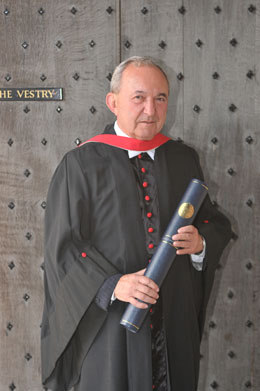Laureation Address – Justice Richard Goldstone
Justice Richard Goldstone
Honorary Degree of Doctor of Laws
Laureation by Dr Anthony Lang
School of International Relations
Tuesday 21 June 2011

Vice-Chancellor, it is my privilege to present Justice Richard Goldstone for the degree of Doctor of Laws, honoris causa.
Richard J Goldstone was born on the 26th October 1938. After graduating from the University of the Witwatersrand with a BA LLB cum laude in 1962 he practised as an Advocate at the Johannesburg Bar. In 1976 he was appointed Senior Counsel and in 1980 was made Judge of the Transvaal Supreme Court. In 1989 he was appointed Judge of the Appellate Division of the Supreme Court. From July 1994 to October 2003 he was a Justice of the Constitutional Court of South Africa. From 1991 – 1994, he served as Chairperson of the Commission of Inquiry regarding Public Violence and Intimidation in South Africa that came to be known as the Goldstone Commission. In this position, he played a central role in helping South Africa transition from an apartheid state to a democracy committed to the rule of law. Crucially, he identified members of the South African security services as instigators of violence, and in so doing, contributed to the pursuit of justice as South Africa moved from a minority white government to a fully democratic one.
As if helping his own country transition from apartheid was not enough, Justice Goldstone turned from this task to the protection of the rule of law at the global level. From 15 August 1994 to September 1996 he served as the Chief Prosecutor of the United Nations International Criminal Tribunals for the former Yugoslavia and Rwanda. As the first prosecutor for the tribunals, Justice Goldstone played a central role in setting a number of their institutional precedents, which then influenced the creation of the International Criminal Court in 1998.
Although his international reputation was now firmly established, Justice Goldstone refused to stop here. In April 2004, he was appointed by the Secretary-General of the United Nations to the Independent International Committee, chaired by Paul Volcker, to investigate the Iraq Oil for Food program. But even this politically fraught situation was not enough for Justice Goldstone. In 2009, he was asked to chair a fact finding mission on possible war crimes and international human rights violations committed by any party in the context of the military action in Gaza in December 2008 and January 2009. When the commission issued its report in September 2009, Justice Goldstone was subject to hostile criticism from those who thought the report was unfair to Israel. Again refusing to take the easy political route, earlier this year, Justice Goldstone wrote an article in the Washington Post in response to a follow up inquiry on the events surrounding the intervention. Upon publication of that article, various parties subjected him to more hostile criticism, yet now from those partial to the Palestinians. For those of us in universities, where our most politically controversial actions may involve whether or not write a critical peer review of an obscure journal article or voice our disagreement with the administration about a new policy, this kind of political courage is impressive to say the least. To those of you graduating today, particularly those in International Relations, I would encourage you to study the career of Justice Goldstone as an exemplar of leadership in the global realm.
The many awards he has received locally and internationally include the International Human Rights Award of the American Bar Association in 1994 and Honorary Doctorates of Law from universities in South Africa, Europe, North America and Israel. He is an Honorary Bencher of the Inner Temple, London, an Honorary Fellow of St Johns College, Cambridge, and an Honorary Member of the Association of the Bar of New York. In October 2006 he shared with Louise Arbour, the UN High Commissioner for Human Rights, the Thomas J. Dodd Prize in International Justice and Human Rights. On top of these awards, Justice Goldstone has also found the time to a memoir and a book on the international judicial system.
In presenting this degree to such a distinguished jurist, the University of St Andrews signals to the world that it supports the virtues of an international political order in which the rule of law is respected and sustained. Justice Goldstone’s courage and commitment to the rule of law in situations of political hostility and even violence should be a model to our students and alumni. Tomorrow, he will present a lecture on the Global Rule of Law, a lecture that I am sure will capture the ideals of the Scottish Enlightenment, such as constitutionalism, human rights and democratic governance. Indeed, it is the title of Justice Goldstone’s memoir – For Humanity – that best captures what he, and this university, believe international law should be. By dedicating his life to the pursuit of the rule of law in both his native South Africa and the global system he embodies what it means to use the law in the service of all of humanity.
Vice-Chancellor, in recognition of his major contribution to the global rule of law, democracy, and human rights, I invite you to confer on Justice Richard Goldstone the degree of Doctor of Laws, honoris causa.
Category Awards